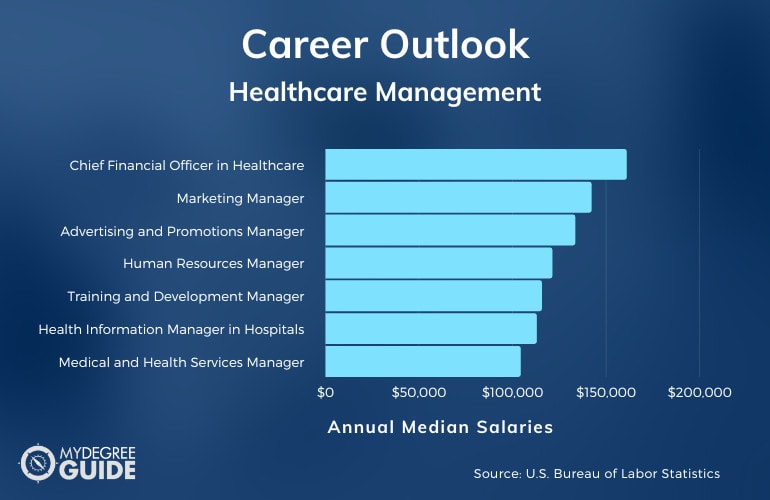Looking for an MBA in Healthcare Management Online Program for 2024? Compare healthcare management programs, career paths, and salaries.

If you’re seeking an advanced degree for high-paying careers in the healthcare industry, consider an MBA in healthcare management online.
Editorial Listing ShortCode:
Not only can it prepare you for a variety of leadership roles in hospitals, clinics, nursing homes, outpatient centers and other organizations, but since it’s delivered digitally, you can earn your degree from the comfort of your own home.
Online MBA in Healthcare Management Degrees
A Master of Business Administration (MBA) is one of the most popular degrees for business students.
There are two options for a healthcare MBA online.
Although there may be some crossover between healthcare management and healthcare administration services careers, there are some important distinctions to consider.
You can also choose to concentrate your MBA on something specific if you already have defined career goals for the future. In addition to the basics of business, you can learn industry-related subjects and skills, and you might just give your resume a boost with a specialized degree.
MBA in Healthcare Management

Healthcare management is devoted to the behind-the-scenes work of hospitals and other medical settings. It could involve everything from paying the bills to managing the paperwork of patients and staff, so it’s a very flexible field, and there are many different job opportunities within it.
Are you good with numbers? You could become a financial director or revenue analyst. Do you have a knack for computers? You could specialize in digital information systems and become an IT professional or medical records manager.
Editorial Listing ShortCode:
There are even careers for creative types. You could specialize in marketing, for example, and dream up cool new ideas for a clinic’s promotional campaigns, or you could study public health education and become a program director for kids and schools.
Regardless of their specialty, healthcare management students should be very detail-oriented. They should be able to work efficiently and independently, especially if they’re aiming for leadership roles, and they should be smart, organized, pragmatic, and able to keep things running smoothly for their workplace.
MBA in Healthcare Administration

Healthcare administration is very similar to healthcare management, and some schools use the terms interchangeably. Employers don’t usually distinguish between them, so in terms of finding a job, you shouldn’t be disadvantaged by going for one title over the other. So why are they separate disciplines at all?
Editorial Listing ShortCode:
Healthcare administration tends to be more focused on the day-to-day operations of a facility whereas healthcare management is devoted to big-picture plans and ideas.
Additionally, healthcare administration might be put in charge of specific tasks like budgeting, staffing, or policy making while healthcare management might oversee their efforts for the good of the entire organization.
As you might imagine, there’s a lot of overlap between these fields, so don’t worry if your school only offers one or the other. You can learn the same skills in both programs, and your degree will help you qualify for the same jobs after graduation.
MBA in Healthcare Management Curriculum & Courses

Every MBA program is unique, so there’s no “standard” list of subjects and classes. Depending on your college, you might be required to take different combinations of credits in business, finance, policy, technology and more.
Here are just a few of the courses that you might see in a healthcare management catalogue:
- Healthcare structure and operations – These classes go by many names, but their overall purpose is the same. They teach about the infrastructure of the healthcare system and how doctors, patients, administrators, insurers and pharmaceutical companies fit within it.
- Human resources – From staff recruitment to compensation benefits, healthcare management can involve many aspects of human resources.
- Legislation and policy – A healthcare management degree should put you on the cutting edge of policies, procedures, trends, and statistics within the industry.
- Healthcare information technology – The world of healthcare is increasingly digital, and these classes are designed to familiarize you with the systems and software programs that are used by modern hospitals.
- Project management – Project management classes cover the fundamentals of budgeting, scheduling, marketing, delegating, and other necessary tasks and actions associated with running a project from start to finish.
- Organizational behavior – Often a requirement for leadership-focused degree programs, organizational behavior is the study of how people behave in groups, and it can be a great source of knowledge for future managers and administrators.
- Research methods – Research methodology is helpful to both students and working professionals. These courses can teach you how to gather, analyze, organize, track and present information in a cohesive way.
- Finance – Even if you aren’t planning on a finance-based career, many healthcare management programs will want you to take basic classes in things like accounting and billing. There might also be a math or economics requirement.
- Data analytics – Data analytics is both a tool and a resource in healthcare management, and these tech-centered classes can show you how it’s done.
- Capstone – Many master’s programs have a capstone requirement. It could be a project or research paper; it could be a semester spent in the field.
For your capstone, make sure that you talk to your university about any face-to-face requirements that it might have. While some online programs are 100 percent online, such as an online MBA in marketing, for example, others are hybrid programs that will ask for an internship or residency in your final year.
Healthcare Management Careers & Salaries

According to the Bureau of Labor Statistics, the median annual wage for a master’s degree holder in the medical and health services management field is about $104,280. This number can and will change depending on things like age, title, experience, location and industry demand.
Editorial Listing ShortCode:
Many careers in healthcare management have a leadership component, so when looking at jobs, you’ll see a lot of titles like director and supervisor.
This is one of the reasons it can be worth the effort to obtain your master’s degree. It can qualify you for these high-level positions, and you can enjoy the salaries that come with them.
Some careers in the healthcare management field include:
| Careers | Annual Median Salary |
| Chief Financial Officer in Healthcare | $160,950 |
| Marketing Manager | $142,170 |
| Advertising and Promotions Manager | $133,460 |
| Human Resources Manager | $121,220 |
| Training and Development Manager | $115,640 |
| Health Information Manager in Hospitals | $112,870 |
| Medical and Health Services Manager | $104,280 |
| Outpatient Care Center Manager | $100,690 |
| Nursing Home Administrator | $89,880 |
| Financial Analyst | $83,660 |
Remember that these numbers are just averages. Your healthcare MBA salary will depend on many different factors, so if you want a more accurate picture of what you might be paid in your chosen occupation, look up specifics for your job title and location.
Choosing an MBA in Healthcare Management Degree

What are the best colleges for a healthcare management degree? To narrow down your options, you might want to make a checklist of your most important values and priorities. Here are a few examples of what you might include –
- Accreditation – Is it regionally, nationally or programmatically accredited?
- Online delivery method – Are the classes synchronous or asynchronous? Are they self-paced? Do you have any flexibility with things like deadlines, assignments and textbooks?
- Credits – How many credits will you need for the MBA program? What are your enrollment options as a full- or part-time student? Do they offer an executive program for working professionals?
- Price – How much is tuition? How much financial aid can the school offer?
Another thing to consider is admission. Between application deadlines and acceptance rates, you’ll want to make sure that you have a realistic chance of getting into your chosen school before you worry about other things.
Admissions Requirements

Admission requirements for a graduate program are stricter than the ones that you might have faced as an undergrad. This is also the case whether it’s an MBA in Finance online or an MA in Marketing in the classroom. The classes are smaller, and there’s more competition for things like financial aid.
You’ll want to do your research on the graduate application process to improve your odds of success. Here are just a few considerations to get you started –
- Transcripts and test scores – Many grad schools expect a 3.0 GPA or higher. They might also ask for Graduate Record Examinations (GRE) or Graduate Management Admission Test (GMAT) test scores.
- Letters of recommendation – You’ll want 2 – 3 letters of recommendation for a well-rounded application, so get started early. If possible, get alumni of that particular MBA program to vouch for you.
- Resume or CV – Professional work experience is best, but if you have any clubs, internships, fellowships, research assistantships or volunteer work that would strengthen your application, add those as well.
- Letter of intent – A letter of intent is your chance to impress the university. You can write about everything from your career goals to your passion for healthcare management, so make your words count.
There could be additional requirements depending on your school, so make sure to check with an academic advisor before you apply.
Accreditation

As a prospective master’s student, you probably already know about college accreditation and why it matters. It’s just as important in choosing a grad school.
If you attend an unaccredited university, you risk the possibility of colleges, companies, and professional organizations not recognizing your degree. Employers might not accept your resume; schools might not accept your credits if you ever need to transfer.
Financial aid can be more difficult, too. Federal programs like FAFSA only recognize accredited schools. Many scholarships will require enrollment at an accredited school.
All things considered, it’s worth the effort of finding an accredited school. You don’t even have to struggle with the task. Just plug your chosen university into the Database of Accredited Postsecondary Institutions and Programs, and the search engine will pull up any relevant information about its accreditation.
Healthcare Management Professional Organizations

It isn’t a requirement to join a professional organization for your industry. However, they can offer a lot of resources for both students and workforce employees, and certain certification programs might ask you to be a member before you can sit for their exams.
Here are a few groups that might interest you as a healthcare management student –
- American Association of Healthcare Administrative Management – As one of the most recognized names in healthcare associations, the AAHAM offers conferences, certifications, webinars, local chapter events and more.
- American College of Healthcare Executives – With almost 50,000 members, the ACHE is a supportive and wide-ranging network for anyone who is passionate about healthcare, including healthcare management students.
- Association for Healthcare Administrative Professionals – The AHCAP offers many membership benefits for students, professionals, vendors and even retirees. Perks include sponsorship programs and educational events.
- Association of University Programs in Health Administration – Like its name suggests, the AUPHA is focused on university students and affiliates, and there are different membership programs depending on your level of study.
- Business Professionals of America – Open to business students of any discipline, the BPA is a technical- and career-orientated organization that offers everything from scholarships to annual events.
- Health Care Administrators Association – The HCAA advocates for healthcare professionals of all types, and they offer a variety of educational and professional resources for those in the industry.
- National Association of Health Service Executives – Open to healthcare executives of all types, the NAHSE has conferences, committees, competitions, student chapters and more.
There are many other organizations that will accept MBA students as well. You don’t have to limit yourself to ones that are focused on healthcare and healthcare management.
Healthcare Management Licensing and Certification

If you want to bolster your resume, a professional certification can add more skills and titles to your name. It can also help you stand out from other job applicants if you’re entering a highly competitive market.
There are many certifications for healthcare management professionals. Their focus areas are just as diverse and wide-ranging as their field, so no matter what you’re interested in, you can probably find a certification program for it.
Here are just a couple of options if you’re looking for something that pairs well with MBA healthcare management jobs –
- Certified Healthcare Administrative Professional – Open to any career professional in the field of healthcare administration, the cHAP assigns points based on education, experience and elective activities. You can get certified through any combination of points as long as you meet all of their criteria.
- Certified Revenue Cycle Professional – Offered by the American Association of Healthcare Administration Management, the CRCP is for revenue cycle specialists who meet certain career requirements and pass an exam. You must be a member of the organization to apply.
Again, there are dozens and dozens of certification programs for healthcare management executives. You’ll have plenty of choices outside of this list.
Financial Aid

Financial aid for graduate students is quite similar to the kind for undergrads. There are just a few differences.
For starters, when you fill out the Free Application for Federal Student Aid (FAFSA), you’ll do it as an independent student without an expected family contribution. You might find that you aren’t eligible for certain grants anymore, including the Pell Grant, but there are always exceptions.
Editorial Listing ShortCode:
Some master’s students are still able to get the Pell Grant when they meet special criteria. Another possibility is loans. You won’t qualify for subsidized loans anymore, but you can take out an unsubsidized loan. These are officially called Direct PLUS Loans.
Finally, you might consider a work-study program. They’re open to students at every educational level, and even though you’re getting your healthcare management degree online, you might be able to snag a campus-based job if you live close to your university.
Healthcare Management Scholarships

If financial aid isn’t enough to cover all of your costs, a scholarship can help. Many of them are open to both undergraduates and graduates, and as an MBA student, you might qualify for everything from business scholarships to healthcare management scholarships.
Here are a few possibilities to consider.
- Albert W. Dent Graduate Student Scholarship – Funded by the American College of Healthcare Executives, this scholarship is for students of color who are enrolled in their last year of a healthcare management grad school program. It’s worth $5,000.
- Ellis Bonner Award – Worth a total of $5,000, the Ellis Bonner Award is for “non-traditional” graduate students who are majoring in healthcare management or a related field.
- Florence Gaynor Award – For women only, this scholarship offers $5,000 to high-achieving female graduate students who are pursuing degrees in healthcare.
- NAHSE Scholarship Program – The NAHSE Scholarship Program is for members of the National Association of Health Service Executives. It’s worth varying amounts for underrepresented students in healthcare management programs.
For more scholarships, contact the advisors at the business department of your college. They should be familiar with all kinds of opportunities for MBA students-.
What Can I Do With an MBA in Healthcare Management?

A business degree can take you in any number of directions, especially when your studies are concentrated in something as flexible as healthcare management.
You can find jobs in numerous settings, including hospitals, clinics, rehabs, schools, and nursing homes. You can work for the government or for a private company or nonprofit. Depending on your interests, you can work behind a desk or with hands-on engagements with others.
You can even take your MBA and apply it to a field outside of healthcare. Since an MBA is a business degree, it can be enough to meet prerequisite requirements for other careers in other industries.
How Much Can You Make With an MBA in Healthcare Management?
The average master’s in healthcare management salary is about $80,000 per year (Center on Education and the Workforce). This number can reach more than $100,000 per year for certain occupations.
Generally speaking, the higher on the corporate ladder that you climb, the more that you can expect to make. A senior healthcare administrator earns more than a junior or entry-level one.
Should I Get an MBA in Healthcare Management?

Before you commit yourself to an MBA in healthcare management, you should think carefully about the challenges involved.
Can you afford it? Do you have time for it? Are you prepared for the difficulties of juggling work and school at the same time, especially with the rigorous demands of an MBA program?
Have you ever taken online classes before, and if so, were you comfortable with that kind of learning?
Which Is Better MBA or MHA?
A Master of Health Administration (MHA) and a Master of Health Management (MHM) are very solid degree choices. So is a Master of Business Administration (MBA) with a specialization in healthcare management.
Editorial Listing ShortCode:
To figure out which degree track is right for you, ask yourself the following questions –
- Do I want a flexible degree that can be applied to many different industries?
- Do I need something with more concentrated studies to be eligible for specific jobs?
- Which degrees does my chosen school offer?
The last question is especially important since schools define their programs differently. For example, some might offer master’s online degree healthcare administration programs while others offer healthcare management programs.
In addition, you may even want to compare which pays more between healthcare management or healthcare administration.
Some might not have a healthcare concentration for their MBA. Always look at their brochures before you make any decisions.
What’s the Difference Between an MS in Healthcare Management vs. MBA in Healthcare Management?

Both degree programs will cover the same subjects. In many cases, you’ll qualify for the same jobs after graduation as well. The difference lies in the scope of their studies.
A master’s degree in healthcare management is focused very specifically on the healthcare industry, but a master’s degree in business administration is broader. It will cover a diverse range of subjects that can help prepare you for work both inside and outside of healthcare.
Is an MBA in Healthcare Management Worth It?
Yes, an MBA in Healthcare Management is worth it for many students. Employment in the healthcare sector are projected to grow 15% over the next decade, much faster than the average for all occupations according to the Bureau of Labor Statistics. Common careers in this field include financial analyst, clinical manager, health information manager in hospitals, marketing managers, and CFO in healthcare.
Healthcare management is a thriving industry, so if you’re looking for high-value degrees in fast-growing fields, an MBA is definitely one to consider.
More than two million jobs are expected to be added to the healthcare industry, so it’s a good time to get your degree.
What is an MBA in Healthcare Management?

A Master of Business Administration (MBA) is a graduate degree for business students. Healthcare management is one of the specializations that you can choose for it, and some schools even offer sub-specializations for healthcare management subjects.
For example, you can study informatics in healthcare systems or financial management for healthcare organizations.
How Long Does it Take To get an MBA in Healthcare Management?
It can take anywhere from one to three years to earn a master’s degree in healthcare management. It requires between 30 to 60 credits in total, so a lot depends on how many credits that you sign up for each semester.
Generally speaking, there are four degree tracks for MBA students:
- Full-time
- Part-time
- Executive
- Online
Full-time students take heavy credit loads that can include both day and night classes. If they’re part of an accelerated program, they can finish their MBA degree program online or on campus in a year at some universities. Online MBA students who take a full-time course load in a 36 credit program can finish in about one year.
Editorial Listing ShortCode:
Part-time students have more relaxed schedules that allow them to juggle other responsibilities outside of school. They might take up to five years to complete their degree, but they don’t have to stop working while they study.
Executive students are enrolled in special Executive Master of Business Administration (EMBA) programs. They’re full-time business professionals who are earning their MBA on the side, so they usually take online, evening, hybrid or self-paced classes with a lot of flexibility.
What Jobs Can I Get with My Healthcare Management Degree?

A master’s education in healthcare management can help prepare you for many jobs, including:
- Hospital administrator
- Public health director
- Medical records manager
- Financial officer
- Medical and health services manager
- Data analyst
It’s just a matter of figuring out where your interests lie.
Universities offering MBA in Healthcare Management Online Degree Programs
Methodology: The following school list is in alphabetical order. To be included, a college or university must be regionally accredited and offer degree programs online or in a hybrid format.

Known as a military-friendly school since 1919, American Public University is a private postsecondary facility that caters to learners looking to earn an undergraduate or graduate degree. APU gives students a flexible option for higher education using an e-learning platform for each of the 200 plus degrees it has.
American InterContinental University is accredited by the Higher Learning Commission.

Opening in 1878 as a school to educate women, Brenau University now serves a diverse community of students that aim to receive an associate degree or higher in an array of course options. This private school has both in-class and virtual classes that cater to students all over the world.
Brenau University is accredited by the Southern Association of Colleges and Schools Commission on Colleges.

The California University of Pennsylvania opened its doors in 1852 and has been striving to bring practical learning and technology advances to students worldwide. CUP has more than 200 academic programs for students who are to advance to an associate, undergraduate, or graduate degree.
Providing both e-learning and traditional classes make CUP a step ahead of others.
The California University of Pennsylvania is accredited by the Middle States Commission on Higher Education.

Students who need a flexible option for college education turn to Capella University to earn a bachelor’s, master’s, or doctoral degree. Capella University opened in 1993 as a leader in online private education. Students at Capella can work at their own pace with guidance and directives from professionals who facilitate fair learning.
Capella University is accredited by the Higher Learning Commission.

Established in 1896, Clarkson University is a private education leader that assists adult learners in gaining an undergraduate or graduate degree online or on-campus.
Clarkson University has a multitude of programs for students to choose from, including business, education, technology, and science. Clarkson is also known for its expansive research facilities.
Clarkson University is accredited by the Middle States Commission on Higher Education.

Concordia University-St. Paul Commenced in 1893 as a private Christian postsecondary school. Students at Concordia University have access to a range of programs to help them earn an associate’s through a doctoral degree in many educational areas. CUSP strives to make a positive impact on its students, community, and the world.
Concordia University-Saint Paul is accredited by The Higher Learning Commission.

Established in 1898, Dallas Baptist University made its mark on the academic world by providing a faith-based private education for students looking to make a difference for others. DBU offers degrees at all levels, from two-year to postgraduate, in both an online and traditional format.
Dallas Baptist University is accredited by the Southern Association of Colleges and Schools, Commission on Colleges.

Located in Center Valley, PN, DeSales University has been delivering private educational options since 1964. Affiliated with the Catholic Church, DeSales University promotes human rights and dignity to all students seeking graduate and undergraduate degrees.
Popular majors at DU include health care, performing arts, education, and business. All first-year students at DU participate in character-building courses.
DeSales University is accredited by the Middle States Commission on Higher Education.

With a focus on science, space exploration, and engineering, Florida International University began in 1965 as a public institution for higher education. FIU is highly respected worldwide as one of the top research facilities that offer undergraduate, graduate, and doctoral degree programs. Its programs are highly recognized by U.S. News & World Report.
FIU has a plethora of online programs to help students who need a more flexible option.
Florida International University is accredited by the Southern Association of Colleges and Schools Commission on Colleges.

Established as a private school in 1821, George Washington University is a prestigious research facility located in Washington DC GWU has numerous program options to assist students looking to obtain an undergraduate, graduate, or postgraduate degree.
Alumni from George Washington University include political leaders, writers, and scholars. E-learning is an available option at GWU.
George Washington University is accredited by the Middle States Commission on Higher Education.

Opening in 1935, Hofstra University sits on a dynamic campus that provides a blend of social activities to help students take full advantage of a private college experience. Hofstra University has more than 160 undergraduate majors and over 165 graduate degree options that allow students the find the program they need.
Hofstra University is accredited by the Middle States Commission on Higher Education.

John Hopkins University was the first research University in the US and opened in 1876. This internationally esteemed college Provides hundreds of academic programs to students interested in gaining a higher education leading to a bachelor’s degree through a doctoral or Ph.D.
Known for its innovations, discoveries, and use of technology, John Hopkins is a highly respected private University.
Johns Hopkins University is accredited by the Middle States Commission on Higher Education.

Opening in 1887, Minnesota State University -Morehead is a public postsecondary school with over 150 undergraduate and graduate degree majors and a diverse student population that represents over 50 countries throughout the world. MSUM enrolls more than 7000 students annually and offers a low teacher to student ratio.
Minnesota State University Moorhead is accredited by the Higher Learning Commission.

Nebraska Methodist College opened in 1891 as a private healthcare educational institution. Affiliated with the Methodist Church, NMC uses hands-on teaching methods to provide students with an elite education with a liberal arts foundation. Students at NMC can obtain an associate’s, bachelor’s, master’s, and doctoral degrees in the healthcare field.
Nebraska Methodist College is accredited by The Higher Learning Commission.

Established in 1998, Northeastern University is a private educational Institute that prides itself on research and hands-on learning. Students of Northeastern University are introduced to campus life during their first and second school years, as they are required to live on campus.
NU has several pathways that allow students to obtain undergraduate, graduate, and postgraduate degrees.
Northeastern University is accredited by the New England Commission of Higher Education.

Parker University is a private postsecondary school with a focus on healthcare, business, and technology. Established in 1982, Parker University is a front-runner in its industry that leads the way for students to obtain an associate through doctoral degrees.
Popular programs at PU include chiropractic, health care systems, and computer information systems.
Parker University is accredited by the Southern Association of Colleges and Schools Commission on Colleges.

As a well respected public research university, Portland State University commenced in 1946. students attending PSU have access to over 200 specialization areas that lead to bachelor’s, master’s, and doctoral degrees. Their hands-on teaching style allows students in virtual and campus classrooms have access to innovative have course studies.
Portland State University is accredited by the Northwest Commission on Colleges and Universities.

Quinnipiac University is a private school of higher education that started in 1929. QU offers bachelor’s, master’s, and doctoral degrees from nine schools: a school of law, medicine, and education. Spreading across three campuses and through a distance learning format, Quinnipiac University strives to meet all learners’ needs.
Quinnipiac University is accredited by the New England Commission of Higher Education.

Opening in 1889, Saint Leo University is a private, Roman Catholic college that reaches a diverse student population. With a liberal arts foundation, students looking to earn a two-year, four-year, graduate, or doctoral degree will receive necessary core studies and a choice in a variety of academic specializations.
Saint Leo University is accredited by Southern Association of Colleges and Schools, Commission on Colleges.

Southern New Hampshire University began as a small private school in 1932. Today SNHU has a large, diverse student population that reaches all over the globe. With hundreds of academic programs to choose from, students hoping to gain an undergraduate, graduate, or doctoral level education Can find what they need at SNHU.
Southern New Hampshire University is accredited by the New England Commission of Higher Education.

Established in 1773, the University of Delaware offers educational solutions for students hoping to gain higher education from a highly esteemed public school. DU has several associate degrees, more than one-hundred bachelor’s and master’s degrees, and fifty-five doctoral programs to support students across eight schools.
Notable alumni at UD include political figures Joe Biden and Al Gore.
The University of Delaware is accredited by the Middle States Commission on Higher Education.

Commenced in 1959, the University of Mary is a faith-based postsecondary school that works to teach students equity and respect as the basics of the many programs they offer. Students earning a bachelor’s, master’s, or higher degree at UM Enjoy the option of virtual or in-class learning. This private school has meaning academic disciplines to choose from.
The University of Mary is accredited by The Higher Learning Commission.

The University of Scranton opened in 1888 and today provides a private college experience with a faith-based foundation. With a combination of bachelor’s and master’s degrees, there are more than ninety program options offered at the University of Scranton.
US works to help every student meet their learning goals by providing both online and in-class learning options.
The University of Scranton is accredited by The Middle States Commission on Higher Education.

Western Governors University is a nonprofit online university that began in 1997 by the governors of 19 U.S. States. However, WGU is a private university, not a state university. WGU MBA in healthcare management is designed to create leaders in the field of healthcare. Students can set their schedule so they can finish their MBA in one year.
WGU is accredited by the Northwest Commission on Colleges and Universities.

Starting in 1821 as a prep school, Widener University became a private college in 1862 as a military academy. Today, Widener University more than six thousand students annually who seek to gain a graduate or undergraduate degree. WU has a low student to teacher ratio and has more than one-hundred program majors to choose from.
Widener University is accredited by the Middle States Association of Colleges and Schools.
Getting Your MBA in Healthcare Management Degree Online

If you’ve already earned a bachelor’s degree and are ready for the challenges of graduate school, consider an MBA in healthcare management. It’s a booming industry with a lot to offer, and thanks to its online degree options, it can be a very accessible one as well.

